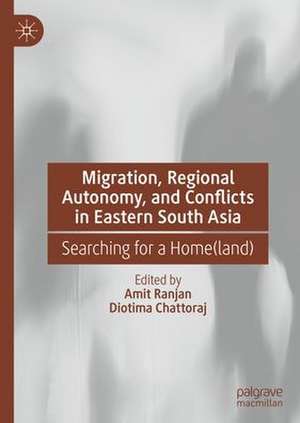Migration, Regional Autonomy, and Conflicts in Eastern South Asia: Searching for a Home(land)
Editat de Amit Ranjan, Diotima Chattorajen Limba Engleză Hardback – 27 mai 2023
| Toate formatele și edițiile | Preț | Express |
|---|---|---|
| Paperback (1) | 798.00 lei 38-44 zile | |
| Springer Nature Switzerland – 28 mai 2024 | 798.00 lei 38-44 zile | |
| Hardback (1) | 895.89 lei 6-8 săpt. | |
| Springer Nature Switzerland – 27 mai 2023 | 895.89 lei 6-8 săpt. |
Preț: 895.89 lei
Preț vechi: 1092.56 lei
-18% Nou
Puncte Express: 1344
Preț estimativ în valută:
171.48€ • 186.33$ • 144.14£
171.48€ • 186.33$ • 144.14£
Carte tipărită la comandă
Livrare economică 21 aprilie-05 mai
Preluare comenzi: 021 569.72.76
Specificații
ISBN-13: 9783031287633
ISBN-10: 3031287630
Ilustrații: XXIII, 337 p.
Dimensiuni: 148 x 210 mm
Greutate: 0.59 kg
Ediția:2023
Editura: Springer Nature Switzerland
Colecția Palgrave Macmillan
Locul publicării:Cham, Switzerland
ISBN-10: 3031287630
Ilustrații: XXIII, 337 p.
Dimensiuni: 148 x 210 mm
Greutate: 0.59 kg
Ediția:2023
Editura: Springer Nature Switzerland
Colecția Palgrave Macmillan
Locul publicării:Cham, Switzerland
Cuprins
Introduction by Amit Ranjan and Diotima Chattoraj.- Section One: Crossing Internal and International Borders.- Chapter 1: Migration, Displacement and Agency in North-East India: A New Outlook by Randhir Gogoi.- Chapter 2: Migration from North-East India since the 1990s: Ethnopolitical Issues and Economic Development Perspectives by Avijit Mistri.- Chapter 3: Bangladeshi Immigration into West Bengal: A Qualitative Study by Sumana Das and Md. Anisujjaman.- Section Two: Movements for Homeland.- Chapter 4: Rohingya Migrants in Bangladesh and India by Amit Ranjan.- Chapter 5: The Nexus Between Indo-Nepal Migration and Trafficking in Persons by Sadikshya Bhattarai, Sudeshna Thapa, and Jeevan Baniya.- Chapter 6: “Ura Uvie”- my home-it belongs to me: Meaning making and transitions in the quest for the Naga homeland by Dr. Kaustubh Deka.- Chapter 7: Armed Conflict in Manipur bySeram Rojesh
Chapter 8: Decoding Bodo Peace Accord 2020: Political Expediency vs. Enduring Ethnic Solution by V. Bijukumar.- Chapter 9: Nepali Speakers of West Bengal, Politics of Self-Rule, and Political Elites by Abi Narayan Chamlagai.- Chapter 10: Migration, Ethnic Conflicts and Negotiations in the Darjeeling Himalayas by Sudip Khasnobish, Chanchal Adhikary and Chanchal Mandal.- Section 3: Defining Self and Others in Eastern South Asia.- Chapter 11: Koch Rajbanshis and the Kamatapur Movement: Competition over Local Resources by Samujjal Ray.- Chapter 12: Madhesi Movement in Nepal by Lalita Kaundinya Bashyal and Keshav Bashyal.- Chapter 13: The Chittagong Hill Tracts Peace Accord: Hope and Reality by Fardaus Ara and Md Mostafizur Rahman Khan.- Conclusion by Amit Ranjan and Diotima Chattoraj.
Notă biografică
Amit Ranjan is Research Fellow at the Institute of South Asian Studies, National University of Singapore. His latest book (with Ian Talbot) is Urban Development and Environmental History in Modern South Asia (Routledge, London, 2023). He is the author of Contested Waters: India’s Transboundary River Water Disputes in South Asia (Routledge, London and New Delhi, 2021), and India-Bangladesh Border Disputes: History and Post-LBA Dynamics (Springer, Singapore, 2018). His papers, review essays, and book reviews have been widely published in journals, including Asian Survey, Asian Affairs, Asian Ethnicity, Asian Journal of Comparative Politics, Economic & Political Weekly, India Review, among others.
Diotima Chattoraj is Adjunct Research Fellow at the school of Social and Health Sciences at James Cook University, Singapore. Her research interests include migration, development, ethnicity, international relations,and boundarymaking.She has published in leading Scopus-indexed journals in migration and development fields like Mobilities, South Asia Research and many more. She has also authored and co-edited a number of books with renowned publishers. She is Assistant Editor for South Asia Research (Sage) and serves as a peer reviewer for a number of refereed journals.
Textul de pe ultima copertă
Delving into the past and present of various secessionist movements in Northeast India, political conflict in Chittagong Hill Tracts in Bangladesh, a political movement for autonomy in Darjeeling hills in Eastern India, and the Rohingya migration crisis affecting India and Bangladesh, this book examines the volatile co-existence of competing population groups in Eastern South Asia. Through the conceptual lens of the ‘home’ and feeling of ‘homeland’ in Eastern South Asia, the authors seek answers to three complex but interrelated questions: why is Eastern South Asia facing so many political movements and conflicts? How have the political movements affected the region and people? Why is the number of migrants in this region so high? Answers to these questions are vital to those studying South Asia and interested in understanding this region.
Amit Ranjan is Research Fellow at the Institute of South Asian Studies, National University of Singapore. His latest book (with Ian Talbot) is Urban Development and Environmental History in Modern South Asia (Routledge, London, 2023). He is the author of Contested Waters: India’s Transboundary River Water Disputes in South Asia (Routledge, London and New Delhi, 2021), and India-Bangladesh Border Disputes: History and Post-LBA Dynamics (Springer, Singapore, 2018). His papers, review essays, and book reviews have been widely published in journals, including Asian Survey, Asian Affairs, Asian Ethnicity, Asian Journal of Comparative Politics, Economic & Political Weekly, India Review, among others.
Diotima Chattoraj is Adjunct Research Fellow at the school of Social and Health Sciences at James Cook University, Singapore. Her research interests include migration, development, ethnicity, international relations, and boundarymaking.She has published in leading Scopus-indexed journals in migration and development fields like Mobilities, South Asia Research and many more. She has also authored and co-edited a number of books with renowned publishers. She is Assistant Editor for South Asia Research (Sage) and serves as a peer reviewer for a number of refereed journals.
Caracteristici
Analyses migration movements beyond Kashmir, including Bangladesh, Nepal, Myanmar and China Considers historical and political influences affecting conflict and migration in Eastern South Asia Discusses the meaning of ‘home’ in migrants' experiences of conflict
